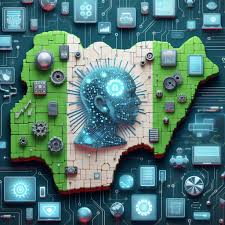By Akande Faith Olajumoke

The Nigerian economy can benefit greatly from the incorporation of artificial intelligence into a number of industries. It can be an effective instrument for tackling many of the urgent issues facing the nation and enhancing governance, technological innovation, and economic stability.Considering how recently AI has been adopted in many nations, we should consider what proactive measures we can take to address any potential obstacles to AI’s integration into Nigeria’s various industries.
Let us examine the advantages of implementing AI in the educational, financial, healthcare, and agricultural sectors.Artificial Intelligence (AI) holds great promise for improving accessibility and affordability of healthcare. The implementation of AI in healthcare systems can solve some of the pressing challenges faced by the Nigerian healthcare sector, including poor information systems, medical intelligence, and patient care.The potential for simple access to patient care in rural areas is one of the biggest advantages of AI for the Nigerian health sector. AI-powered telemedicine platforms have the potential to close the distance between patients and physicians, particularly for those who reside in underserved or remote areas. By using these platforms, patients can obtain medical advice and prescriptions without ever leaving their homes thanks to virtual consultations and remote monitoring technology.AI has a lot to offer the agricultural industry. It can help with low farm productivity, wasteful resource use, and food insecurity, to name just a few. Crop yields can be increased, resource management can be optimized, and farmers’ livelihoods can be enhanced by incorporating AI into agricultural practices.
AI technologies are being used in agriculture to assist farmers with weather forecasting, soil health testing, and disease containment on farmland. A handful of Nigerian agritech companies gather data on temperature, nutrient levels, and soil moisture using AI-powered sensors. Farmers can use the analytical results to determine the best times and methods for fertilizing and irrigating their crops. Nigeria’s agriculture industry can undergo a revolution if these solutions are implemented more widely.
AI is already having a number of positive effects on the education sector. Nigerian students are already using AI for research, contextualization, and class assignments thanks to programs like Chat GPT 3.5 and 4.0. These resources even assist students with disabilities in developing their capacity for learning. Both students and lecturers have reported finding learning and research in this field to be considerably simpler.Universities, research organizations, and other institutions must work together for AI to be adopted in this industry effectively. These partnerships have the potential to bring together the varied knowledge, assets, and financial support required to progress AI development and application.
Additionally, AI will transform current jobs and create new ones, which will inevitably strengthen the economy of the country. Although AI may automate some tasks, it will also create new roles that call for human creativity and skills. Certain data-driven tasks will no longer require a large workforce and will be completed faster and more effectively thanks to AI, which makes tasks simpler for workers. This will enable human resources to concentrate on strategically important and complex tasks, resulting in a workforce that is more inventive and productive.But before Nigeria can take advantage of AI, it needs to create an environment that will allow it to flourish. To make this happen, government and private entities in Nigeria must collaborate to promote AI integration.Insufficient infrastructure is one of the main issues impeding the integration of AI in the Nigerian economy. Nigeria will need to upgrade both its digital and physical infrastructure if it hopes to fully benefit from AI. The development of AI heavily depends on internet accessibility, and only a few areas can currently claim better internet networks. Another barrier to AI adoption in Nigeria is the availability of power. Businesses would need to access AI, which would require improved power supplies.The lack of experience and ignorance regarding AI is another factor to take into account. There are still a lot of government agencies and business owners who are dubious about integrating AI into their operations. By working with top industry experts to decode the technology, the public and private sectors can resolve this issue. However, seminars and training can be scheduled to close the gap.Ethics and laws pertaining to AI are additional barriers to the nation’s adoption of AI. To guarantee that AI companies do not abuse personal human data, the government must comprehend the proper legal framework for AI and put these regulations into place. In light of the adoption of AI, it is imperative to address concerns regarding data security and privacy. This can be achieved by enforcing strict laws and regulations pertaining to data protection as well as by encouraging moral AI practices that put people’s rights and welfare first.
In conclusion, with the world growing more reliant on technology, artificial intelligence (AI) is critical to Nigeria’s future development. Nigeria has to solve the obstacles preventing the use of AI if it hopes to stay ahead of the curve and seize the opportunities it presents. To embrace the revolutionary technology of artificial intelligence, all stakeholders—including the government, corporations, and educational institutions—must move quickly.
